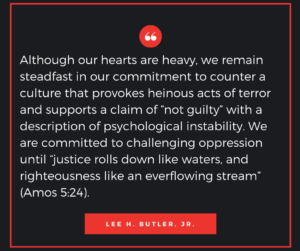A Statement on the Buffalo Massacre and Laguna Woods Shootings
Two men, on different days, travelled miles and hours away from their homes to kill those they knew not. While the actions of both men have been called crazy, we must not overlook the fact that both men were calculating. Ethnocentric rage consumed their hearts. Xenophobia consumed their souls. Both gunmen believed the ravenous lion within would only be satisfied by human sacrifice.
Neither gunmen assaulted the young. Like the most notorious massacres in American history, the gunmen attacked the elderly—the wisdom of the community. Their violence claimed the lives of those who represent the stability of community. The blood cries out from the ground, “Black Lives Matter!” and “Asian Lives Matter!” while the blood that seems to run cold within the perpetrators’ veins respond, “Our Lives Matter!”
 One place, an oasis in a food desert, and another place, a sanctuary in the midst of hostility. Both became spaces of victimization and sites of trauma as crimes against humanity were once again motivated by hate. Is there a place of safety beyond our front doors? Perhaps it is safer to stay home to shop and worship online. Shall we ever find peace in the valley? It is difficult to imagine as we walk through a valley overshadowed by death. Shall we see the day when the lion shall lie down with the lamb? It is difficult to imagine when our “adversary the devil, as a roaring lion, walks about, seeking who among us may be devoured” (I Peter 5:8).
One place, an oasis in a food desert, and another place, a sanctuary in the midst of hostility. Both became spaces of victimization and sites of trauma as crimes against humanity were once again motivated by hate. Is there a place of safety beyond our front doors? Perhaps it is safer to stay home to shop and worship online. Shall we ever find peace in the valley? It is difficult to imagine as we walk through a valley overshadowed by death. Shall we see the day when the lion shall lie down with the lamb? It is difficult to imagine when our “adversary the devil, as a roaring lion, walks about, seeking who among us may be devoured” (I Peter 5:8).
Today, Phillips Theological Seminary laments and mourns with the communities of Buffalo, NY and Laguna Woods, Calif. Although our hearts are heavy, we remain steadfast in our commitment to counter a culture that provokes heinous acts of terror and supports a claim of “not guilty” with a description of psychological instability. We are committed to challenging oppression until “justice rolls down like waters, and righteousness like an everflowing stream” (Amos 5:24).
Lee H. Butler, Jr., PhD
Vice-President of Academic Affairs and Academic Dean, William Tabbernee Professor of the History of Religions and Africana Pastoral Theology

